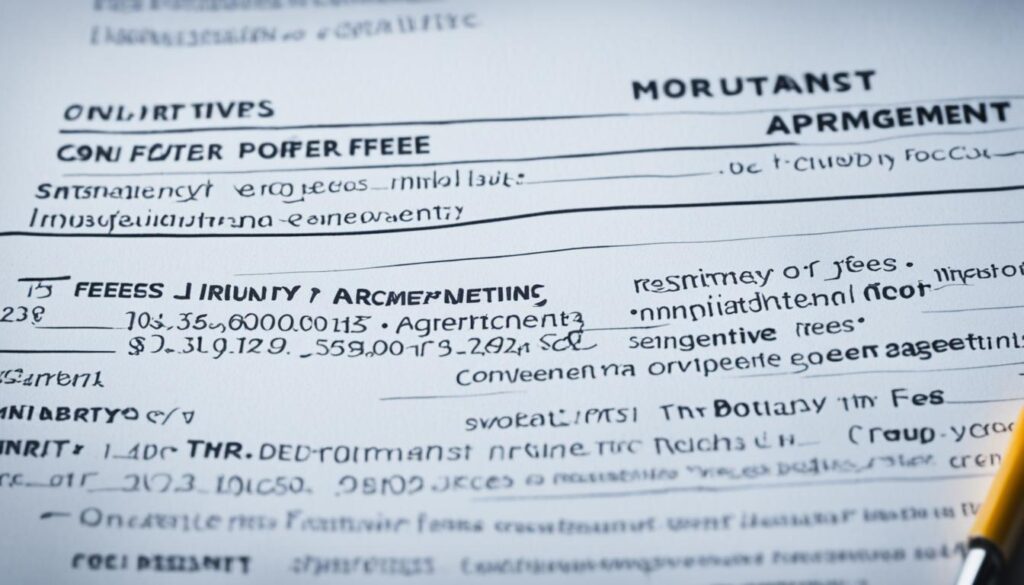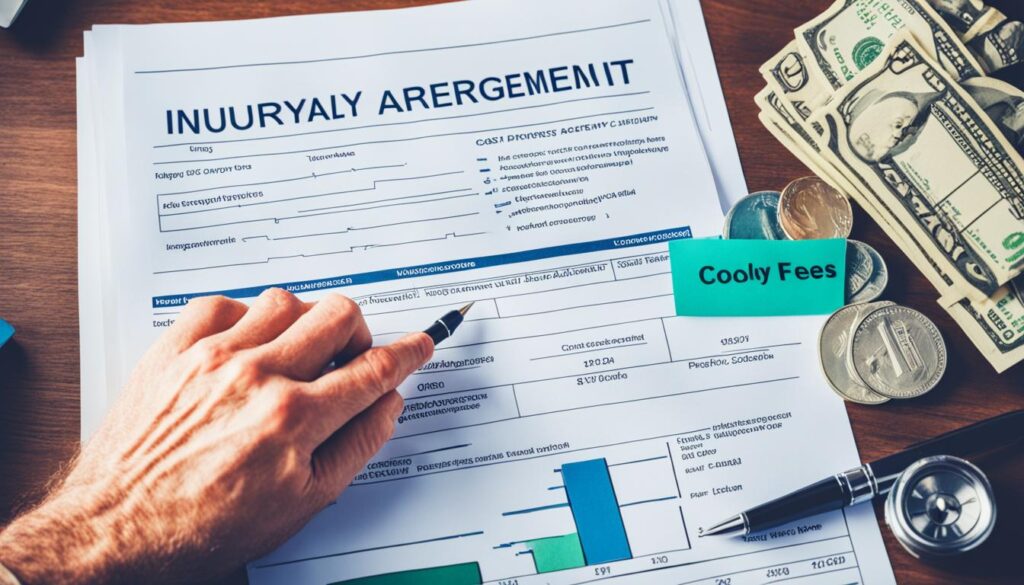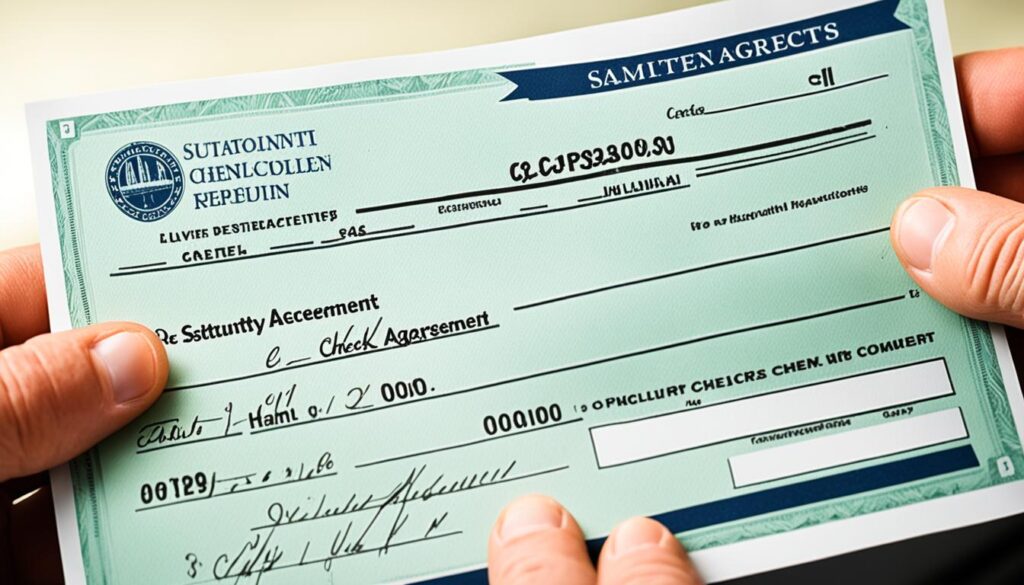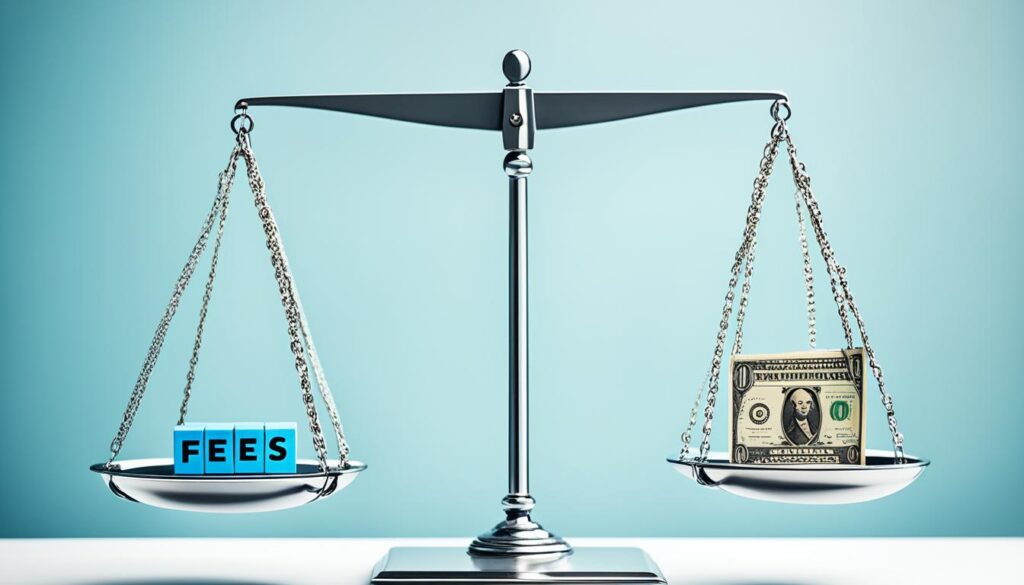Considering hiring a personal injury attorney? One key aspect is the cost of their services. Imagine getting legal support without needing to pay upfront. This article will discuss the fee agreements lawyers use. These include contingency, hourly, and retainer models. Let’s see how they affect your personal injury claim.

Key Takeaways:
- Knowing the different fee agreements can aid in choosing a personal injury lawyer wisely.
- Contingency agreements mean no initial costs. Fees come from the client’s settlement or award.
- Hourly and retainer fees require ongoing payments, which might be hard for some people to afford.
- Talking about costs, expenses, and how fees work with your lawyer is crucial.
- Sometimes, the losing side must cover the winning side’s lawyer fees. Usually, everyone pays their own legal costs.
What are Retainer/Hourly Fee Agreements?
Hiring a lawyer on an hourly basis often involves retainer fees. These fees help cover the legal costs and expenses related to your case. In this setup, clients make an upfront payment. This payment is called a retainer. It is used for the lawyer’s hourly fees and other costs that may come up.
Lawyers charge hourly fees based on the time they spend on your case. These rates can change. It depends on how complex your legal issues are and the lawyer’s experience.
“Retainer fees and hourly fees are common in many legal matters, but they may not be the most suitable option for every client.”
In personal injury cases, many lawyers opt for a contingency fee basis. This approach doesn’t require retainer fees or initial payments. Here, the legal costs and expenses are covered by the lawyer. Clients only pay if they win the case and get a settlement or award.
This fee arrangement helps people afford legal help. It allows those hurt or wronged to pursue justice. And they don’t have to worry about costs upfront.
Let’s look at the main points of retainer/hourly fee agreements:
| Retainer/Hourly Fee Agreements | Contingency Fee Agreements |
|---|---|
| Require clients to pay retainer fees and hourly fees | No retainer fees or upfront payments required |
| Legal costs and expenses are billed to the client | Lawyer covers legal costs and expenses |
| Clients pay regardless of the outcome of the case | Clients only pay if they win the case and receive a settlement or award |
| May be more suitable for clients with non-personal injury legal matters | Commonly used in personal injury cases to make legal representation more accessible |
Retainer/hourly fee agreements are popular in law. But clients should know their financial duties. They should look at other options like contingency fee agreements. These might be an option in some cases.
How Contingency Agreements Work
In personal injury cases, many lawyers work on a no-win-no-fee basis. This setup makes legal aid more accessible for those who need it. There are no upfront charges or costs, so clients can chase their personal injury claims more comfortably.
With a contingency agreement, lawyers handle all related case expenses. This includes filing fees and the cost of expert witnesses. It lets clients focus on healing while their case moves forward, without worrying about money.
Such agreements knock down the financial walls that stop people from getting legal help. Personal injury lawyers get that their clients might already be under financial pressure because of medical bills. Working on a contingency basis, they give clients a chance to get the compensation they rightly deserve.
The lawyer’s fees come out of the case’s winnings or the settlement amount. Clients don’t have to pay anything from their pockets for legal fees. Lawyers usually take a cut of 33% to 40% of the final award. But, the exact slice depends on how complex the case is and the agreement with the lawyer.
The goals of the lawyer and the client are the same under a contingency agreement. The lawyer aims to get as much as possible for the client because it directly affects their own payment. This motivates the lawyer to work hard for the best outcome for their clients.

Benefits of Contingency Agreements
Contingency agreements have huge benefits for those pursuing personal injury claims:
- Financial Accessibility: Legal help is within reach without upfront payments or hefty retainer fees.
- No Upfront Costs: Clients don’t stress about legal expenses until their case is done.
- Aligned Interests: Lawyers aim for the highest compensation for their clients, ensuring they are well-represented.
- Risk-Free: If the case doesn’t win, clients don’t pay the lawyer’s fees, cutting out the financial risk of suing.
By using a contingency model, personal injury lawyers open the door to legal help for those wronged or hurt, letting them seek the compensation they deserve.
| Advantages of Contingency Agreements | Disadvantages of Contingency Agreements |
|---|---|
|
|
Types of Cases a Lawyer Who Works on Contingency Takes On
Lawyers on contingency focus on several civil cases. These include car accidents, medical malpractice, and personal injury. They aim to help clients get the compensation they need for their injuries. These compensations cover damages from accidents and mishaps.
Been in a car accident? A contingency lawyer can help. They offer legal advice to tackle the case’s challenges. Their goal is to make sure you get paid for medical costs, lost earnings, and pain. Plus, they cover other losses from the accident.
For medical malpractice, a contingency lawyer is there to help. They work to make careless medical staff pay for their mistakes. You’ll get help to get compensation for the harm caused by medical errors. This includes misdiagnosis, surgery blunders, and more.
Personal injury cases cover many incidents. Think slip and falls, workplace accidents, dog bites, etc. A lawyer on contingency will strive to prove who was at fault. They seek compensation for your injuries and the costs related to them.
| Type of Case | Description |
|---|---|
| Car Accidents | Seeking compensation for injuries and damages resulting from car accidents |
| Medical Malpractice | Holding medical professionals accountable for negligence and seeking compensation for related injuries |
| Personal Injury Cases | Assisting clients in various personal injury cases, including slip and falls, workplace accidents, and dog bites |
Contingency Fee Percentages: What Percentage Do Lawyers Take for a Personal Injury Case?
In personal injury cases, lawyers usually charge a contingency fee. This is a portion of the client’s settlement or award. Clients can get a lawyer without upfront costs. Their payment depends on winning the case. This makes legal help available to those who can’t afford lawyer fees.
The usual contingency fee is 33% to 40% of the total amount won. This rate can change based on the case’s complexity. Because lawyers get paid from the case’s outcome, they are driven to get the best result for their client.
If the client loses, they don’t pay the contingency fee. This way, clients can chase their claims without the worry of paying legal fees for nothing. This adds security for clients.
However, the contingency fee doesn’t cover other case costs. This includes filing fees and expert witness fees. Clients may need to pay these costs back, even if they lose.
“The contingency fee model allows people with valid personal injury claims to seek legal representation without worrying about exorbitant upfront costs. It aligns the lawyer’s interests with those of their clients, as both parties benefit from a successful outcome.”
Let’s look at how personal injury lawyer fees work with an example:
| Settlement/ Award Amount | Contingency Fee (40%) | Client’s Net Recovery |
|---|---|---|
| $100,000 | $40,000 | $60,000 |
| $200,000 | $80,000 | $120,000 |
| $500,000 | $200,000 | $300,000 |
It’s vital for clients to talk clearly with their lawyer about fees and expenses. Knowing the financial details helps clients be more confident. They can focus on getting better while their lawyer handles the case.

The “Sliding Scale” Option
Some lawyers have a special way to charge for legal cases called the “sliding scale.” This method changes the fee based on how complex the case gets. If the case settles or goes to trial, the fee changes.
If a settlement is reached early, the sliding scale fee is usually lower. This helps clients save money and avoid a long trial. But, if the case goes to trial, the fee goes up because there’s more work and risk.
The fee also depends on how complex the case is. Tough cases needing lots of research or experts have higher fees. This is because the lawyer needs to do more to make a strong case.
The sliding scale offers flexibility for clients and lawyers. It creates a fee that fits the case’s unique details. Lawyers provide clearer billing by matching the fee with the case’s needs.

Choosing a lawyer with a sliding scale fee option gives clients more control over costs. They still get skilled help. It’s vital to talk about fees with your lawyer to understand the sliding scale clearly.
Costs and Expenses in a Personal Injury Case
In a personal injury case, knowing the possible costs and expenses is key. You may need to pay your lawyer back for costs during the case.
“Being aware of the costs and expenses associated with your personal injury case is crucial to ensure proper financial planning and understanding of the overall investment required.”
The costs can include:
- Court filing fees
- Copying and document retrieval fees
- Expert witness fees
- Investigation costs
- Medical record retrieval
- Postage and delivery charges
- Travel expenses
Adding up, these expenses might affect your final settlement. Talk to your lawyer about these costs early on. It helps with planning your finances.
Reimbursement From Settlement or Award
Before calculating your lawyer’s fee, they usually take out costs and expenses from your settlement. This means they remove their costs from the amount you get.
“Understanding the reimbursement process and how costs and expenses will be deducted from your settlement or award can provide valuable insights into the financial aspects of your personal injury case.”
Your lawyer will track these costs for transparency. It’s key to look over these records and ask your lawyer any questions.
The Importance of Financial Planning
With possible high costs, planning your finances is essential. This planning must involve talking to your lawyer about expected costs and case outcomes.
Knowing the financial side helps you make smart decisions about your case. It also ensures you’re ready for any costs that come up.
Every case is different, so costs vary. A chat with a skilled lawyer can help you understand what costs to expect.
Example of Costs and Expenses in a Personal Injury Case
| Expense | Estimated Cost |
|---|---|
| Court filing fees | $250 |
| Copying and document retrieval fees | $100 |
| Expert witness fees | $5,000 |
| Investigation costs | $2,500 |
| Medical record retrieval | $500 |
| Postage and delivery charges | $50 |
| Travel expenses | $1,000 |
Note: The table shows some costs in a personal injury case. But, your case may have different costs.

Who Pays for Costs If You Lose Your Case?
Winning a personal injury case is the goal, but losing is possible. Knowing who covers the costs then is vital. If you lose, you may need to pay for the costs and expenses incurred. This includes legal fees, court costs, and expert witness fees.
Your agreement with your lawyer affects who pays these costs. There are several options:
- Lawyer agrees not to make the client reimburse them: Sometimes, lawyers don’t ask clients to repay the costs and expenses. This could be seen as a kind gesture or part of the fee deal.
- Splitting the costs with the client: The costs can also be divided between you and your lawyer. This shows both share the case’s financial impact.
- Client agrees to reimburse the lawyer in full: You might also agree to pay all the costs and expenses yourself. This could be part of the original fee agreement or decided after the case ends.
Talking about these **costs and expenses** with your lawyer is critical. Make sure these discussions are part of your fee agreement. This helps avoid any surprises later.
Understanding the Financial Implications
Considering the financial impact of losing a personal injury case is crucial. Talk about **costs and expenses** with your lawyer early on. This allows you to make informed choices and plan effectively.

Your Lawyer Will Receive the Settlement Check
After your personal injury case is settled, know how the settlement check will be managed. Usually, the check goes straight to your lawyer. They then put it into a special account for settlements and expenses.
Handling the settlement check is more than just depositing it for your lawyer. They also pay off any debts, like liens, and case-related costs. This way, everything financial is sorted out fast, letting you get your due money.
Your lawyer subtracts their fees, costs, and expenses from the settlement. Then, they give you what’s left. This process is clear so you know how the money is shared out.
Talk openly with your lawyer before settling. This makes sure you get how fees and expenses are taken out. It helps prevent shocks and sets the right expectations for what you’ll really get.

What if You Fire Your Lawyer Before the Case Is Over?
If you decide to change lawyers or go it alone, you might still need to pay your old lawyer. It’s important to talk about fee issues early on and have a clear deal about costs.
It’s not rare for people to switch lawyers. Sometimes, you might not see eye to eye on how to handle your case. Or you might feel your lawyer isn’t living up to your expectations. Knowing the possible downsides, like having to pay outstanding fees, is key before making a switch.
If you’re thinking about changing your lawyer, go over your fee agreement first. Talk to your new lawyer about it, if you have one. Your old lawyer may still ask for payment for past services.
“If a client decides to switch lawyers or represent themselves, they may still be responsible for paying the fees and expenses incurred by their former lawyer up to that point.”
Your lawyer puts time, skills, and effort into your case. This results in legal fees and other costs. If you fire them, you might still have to pay these.
Sometimes, if you don’t pay, your old lawyer might keep your case files. They could even sue you to get the money you owe. So, it’s crucial to settle any owed money quickly.
To steer clear of disputes over money, make sure you have a clear contract with your lawyer. This should detail how payments work, how you’ll handle costs, and what happens if you part ways.
Fees and Expenses in Detail:
| Item | Description |
|---|---|
| Hourly Fees | The amount charged per hour of legal services provided by your former lawyer |
| Unpaid Expenses | The outstanding costs and expenses related to your case, such as court filing fees, expert witness fees, and copying fees |
| Unbilled Costs | The legal expenses that have not been invoiced to you yet, but have been incurred by your former lawyer |
Think carefully before you decide to fire your lawyer. Understand how it might affect your case and the money you owe your old lawyer.

Good communication with your old and new lawyers helps smooth things over. Talk to your new lawyer for advice on handling the switch, especially the financial part.
Alternative Types of Fee Arrangements
Contingency fees are common in personal injury cases. However, lawyers may offer other fee arrangements. Knowing these options helps you choose the best one for your case.
Fixed Fees
A fixed fee means paying a specific amount for routine legal matters. It is for cases that are straightforward and predictable. This arrangement lets clients know exactly what they’re paying upfront. Fixed fees are often for creating wills, drafting contracts, or real estate transactions.
Hourly Fees
Hourly fees are based on the time a lawyer spends on your case. They have an hourly rate, and the total cost depends on the hours worked. This method is for complex cases needing research, negotiation, and court time. It is vital to know the lawyer’s hourly rate and their time tracking method.
Retainer Fees
With retainer fees, clients pay a down payment upfront for the lawyer’s services. The lawyer then bills against this retainer. It’s often for ongoing cases, like divorces or business advice. This ensures the lawyer’s commitment to your case. Be sure to discuss how the retainer is applied and when more payments could be needed.
When looking at these fee arrangements, talk openly with your lawyer. They can outline the pros and cons of each option for your situation. This way, you can make a well-informed choice that fits your needs and budget.

Can I Get the Other Party to Pay My Lawyer Fees?
In the United States, each person usually pays their own lawyer fees in a legal dispute. This is true no matter who wins the case. But, there are some special exceptions.
Sometimes, the losing side must pay the lawyer fees for the winning side. This can happen because of certain laws or agreements. It’s very important to know the rules about lawyer fees where you live.
If you think the other party should pay your lawyer fees, talk to your lawyer. They will help you understand if you can ask the other side to pay your fees.